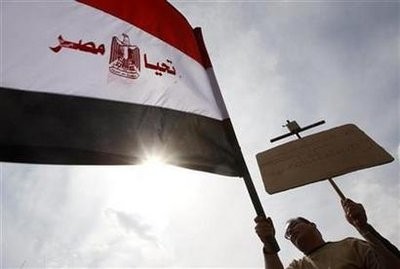President Barack Obama will unveil an economic aid program for Egypt and Tunisia on Thursday as part of a broad effort to support democratic reform in the Middle East and North Africa, U.S. officials said.
Senior advisers to Obama, previewing parts of his speech, said Wednesday the United States would offer debt relief totaling roughly $1 billion "over a few years" to Egypt through a debt swap mechanism that would invest the money to boost youth employment and support entrepreneurs.
Washington would also loan or guarantee loans up to a total of $1 billion through the Overseas Private Investment Corp (OPIC) for Egypt to finance infrastructure development and boost jobs, the officials told reporters on a conference call.

Several billion dollars in additional financing would come from multilateral development banks as well.
The administration would also seek to foster trade and economic development throughout the region and encourage private sector investment, the officials said.
"We think these initiatives will help Egypt and Tunisia as they undertake the twin challenges of economic transformation and democratization," one official said.
The officials dodged a question on whether the debt relief package was enough.
"Egypt has, I think, a very good prospect of accessing private capital markets, and that's important to Egypt's future economic vibrancy, and that's something that we know economic leaders in Egypt want to reinforce," one official said when asked why the country's full debt was not canceled.
In his widely anticipated speech Thursday, Obama aims to present a coherent approach for dealing with unprecedented political upheaval that has swept the region and upended decades of U.S. policy.
Part of that approach will include boosting economic fundamentals to spur democratic reform.
"We ... know from our study of the past that successful transitions to democracy depend in part on strong foundations for prosperity, and that reinforcing economic growth is an important way of reinforcing a democratic transition," one official said.
ECONOMIC PUSH
The United States would form "Egyptian-American and Tunisian-American Enterprise Funds" to promote investment from the private sector, the White House said in a statement laying out some of its proposals.
Washington would also work with allies to reorient the European Bank for Reconstruction and Development to support the Middle East and North Africa region just as it helped countries in Central and Eastern Europe.
U.S. officials are concerned about the economic outlook in Egypt and Tunisia after democratic revolutions swept out long-ruling autocratic leaders.
Growth forecasts have been revised downward to 1 percent in Egypt and gross domestic product growth in Tunisia is expected to be close to zero this year, the White House said.
The White House hopes to send a message to other countries in the region that they, too, could benefit from economic backing if they pursue a democratic path.
"Part of the purpose of this economic program ... is to reinforce not only positive change in Egypt and Tunisia, but a positive model that can empower and incentivize democratic change and economic reform in other parts of the region," one official said.
























